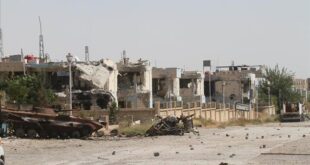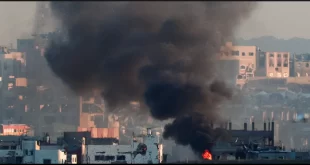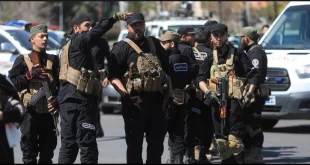Jun 3, 2014, Times of India
On Tuesday morning, a 40-year-old woman called Ferial Mustafa whose son was tortured to death by militants in Syria cast her vote for President Bashar Al Assad at a polling booth in Gundanieh, on the outskirts of Damascus. She stood proudly beside Assad’s photograph and said she would sacrifice her own life, and that of her other two sons, for Syria and Assad. She had heard her son being tortured to death by militants over the telephone.
In Jaramana, another town close to the Syria’s capital, Marwad Fehmi (52), who lost his 25-year-old son in a car bomb, refused to keep his ballot secret. He did not carry the voter slip to the curtained enclosure, but ticked on Assad’s photo in full public view.
A TV journalist from Syria showed TOI a photograph of himself voting for Assad. If the sentiment in and around Damascus is anything to go by, President Assad has already won the election on polling day. For those visiting polling booths, there was little doubt who would win the elections. A fashion designer pledged her love for Assad, too. Assad was on the T-shirts of young men and women who cast their votes. Chants of “Allah. Sooriya (Syria). Bashar Al Assad,” rent the air at virtually all the ten odd polling booths TOI visited on the outskirts of Damascus.
For a war-torn country voting under tight security, with the military guarding polling booth and the sound of cross-fire in the distance, the city wore a remarkably festive air. Men and women sat in open cars waving the Syrian flag, and chanting slogans in favour of Assad inside poll booths, with the military joining in. It was impossible to turn a street corner without a photograph of Assad turning up. He was on the banners that hung off buildings. His pictures stood between mannequins in malls. And three year old children perched on their parents’ shoulders chanted his name. The faces of the other two candidates contesting the elections were visible only inside polling booths and on the ballot paper.
Polling took place in 9601 election centres in Syria. In rebel control areas such as the city of Raqqa, no polling took place. While polling was to take place between 7 am and 7 pm, the deadline was extended to midnight.
The Assad family has ruled Syria for 40 years after a coup by Assad’s father. While Assad was once at the receiving end of protests in Syria during the Arab spring, and targeted for being a dictator who sailed through two elections unopposed, civil society protesters were swiftly marginalized by armed militants from outside Syria who turned the country into a battleground for international forces.
“Armed Islamist extremists have unleashed terror on the people of Syria. They were backed by Western nations such as the US, UK and France as well as some Gulf monarchs,” said Saeed Bahar of Ibaa, a human rights organization working for victims of the war. Ibaa founder Zainab Morad lost her son to the terrorists whose missiles brought down her house with her 14-year-old son inside. “Men and women were raped and tortured in the most brutal fashion,” says Bahar.
Had the foreign militia not turned Syria into their playground, Assad may have faced greater resistance at the ballot, says Mehdi Sharafat, an Indian journalist based in Iran. He points to the democratic reforms that Assad initiated, which also won him popular support. For many, he is now seen as the only force that binds Syria together.
 Syria Support Movement solidarity with the Syrian people
Syria Support Movement solidarity with the Syrian people




